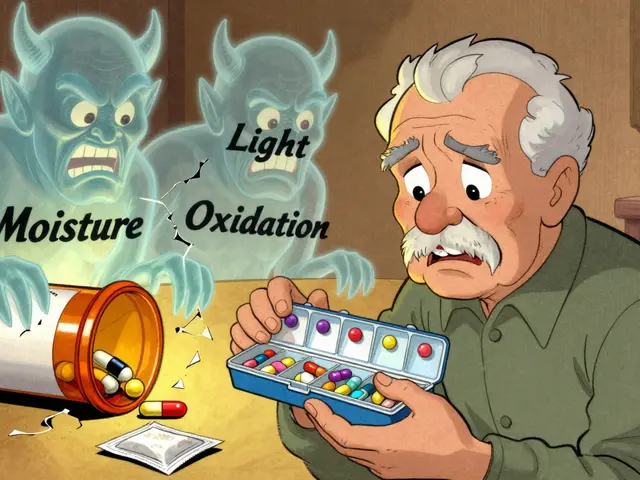When it comes to treating inflammation or calming down an overactive immune system, Prelone (prednisolone) has been a go-to for years. But sometimes you need a backup. Maybe Prelone triggers weird side effects, or maybe your pharmacy is out (yep, shortages happen). That’s where this list comes in handy.
There’s no one-size-fits-all substitute—what works for asthma might not work for arthritis, and what’s safe for kids isn’t always right for adults. Some of these options are stronger, some are milder, and others are tailored for specific problems like allergies or adrenal issues.
This isn’t the spot for wild guesses or home remedies. We're diving into the mainstream alternatives that doctors actually use—and what makes them tick. You’ll see how they stack up, what you might like about them, and what could make you think twice.
So if you’re mapping out a plan with your doctor, or just digging for info before your next appointment, keep reading. Knowing your options gives you power over your health—and helps you dodge surprises down the road.
- Hydrocortisone
- Methylprednisolone
- Dexamethasone
- Prednisone
- Budesonide
- Triamcinolone
- Betamethasone
- Deflazacort
- Fludrocortisone
- Making the Choice: Summary & Comparison
Hydrocortisone
Hydrocortisone is one of the most recognizable Prelone alternatives. It’s not as strong as prednisolone, but it still packs a punch when it comes to reducing swelling and tamping down overactive immune responses. Doctors use hydrocortisone for a bunch of issues—think allergies, skin flare-ups, asthma, and sometimes in emergencies when the body suddenly needs more steroids (like with Addison’s disease).
One thing to know: hydrocortisone mimics the body’s natural stress hormone, cortisol. That’s why it’s usually the first choice for hormone replacement if your body isn’t making enough on its own. It’s available as pills, shots, creams, and even IV for emergencies. Compared to Prelone, it often gets used for less severe cases of inflammation or as a daily maintenance drug for adrenal problems.
Check out this basic difference between doses, which might come up with your doctor if you switch over:
| Drug | Typical Oral Dose (mg) | Anti-inflammatory Strength |
|---|---|---|
| Hydrocortisone | 20-30 mg | Low |
| Prednisolone (Prelone) | 5-10 mg | Moderate |
No matter how you take it, you’ll need to check with your doctor about adjusting the dose. Too much can cause weight gain, mood changes, and even mess with blood sugar.
Pros
- Great match for hormone replacement (especially Addison’s disease)
- Milder compared to stronger corticosteroids (less risk of certain side effects)
- Short-acting—gets cleared out fast by your body, which can be handy for short bursts of treatment
- Comes in a lot of forms: creams, pills, injections (makes it easier for different needs)
Cons
- Not strong enough for severe flares or immune diseases
- Needs to be taken more often than some other steroids due to shorter action
- Still causes side effects like upset stomach, mood swings, and risk of infection
- Overuse can mess with the body’s natural steroid production
If you’re weighing hydrocortisone as a Prelone alternative, keep these trade-offs in mind. It works best for mild or hormone-related problems, rather than the heavy-duty stuff.
Methylprednisolone
If you’ve ever had a tough asthma flare or a sudden joint inflammation, there’s a good chance your doctor mentioned methylprednisolone. This steroid is in the same family as Prelone alternatives (yep, it’s a corticosteroid), but it’s known for its punch and quick results. Doctors often use it when they need something more powerful or fast-acting.
Methylprednisolone is available in pills, as a shot, and even as an IV dose for emergencies. Its flexibility is a reason it’s so popular for hospital use—especially for things like major allergic reactions, sudden asthma attacks, or severe rashes. Oral forms, like the famous Medrol Dosepak, are common for treating arthritis, breathing issues, and more.
Pros
- Works faster than most other oral steroids—people often notice improvement within a day or two.
- Can be given as a shot or IV, which matters if someone can’t swallow pills or needs urgent care.
- Often easier to taper down (stop gradually) because of package options like the Medrol Dosepak.
- Really effective for stubborn inflammation, especially in the lungs and joints.
Cons
- Not everyone can take it—certain meds or health conditions (like ulcers or diabetes) can clash with methylprednisolone.
- Common steroid side effects show up here too: weight gain, mood swings, higher blood sugar, and trouble sleeping.
- If used often, or for too long, it can mess with your bones or suppress immune function.
- IV or shot versions are usually given in clinics or hospitals, so not as easy as a home pill.
Doctors usually weigh methylprednisolone against prednisolone alternatives based on how fast you need relief and what your body can handle. If you’re thinking about switching from Prelone for flare-ups or acute problems, this is often the go-to.
| Form | Typical Use | Speed of Action |
|---|---|---|
| Pill (oral) | Home treatment for inflammation and allergies | 1-2 days |
| Shot or IV | Hospital treatment for severe cases | Within hours |
Dexamethasone
Dexamethasone is one of those heavy-hitters in the corticosteroid world. If you’re looking at Prelone alternatives for tough inflammation or immune system issues, this one pops up on doctors’ lists a lot. It’s even made headlines during the COVID-19 pandemic because it helped seriously ill patients breathe easier—so we're talking about a well-studied, widely used medicine here.
Dexamethasone stands out because it’s much more potent than prednisolone (the active ingredient in Prelone). It sticks around in the body longer, which means you usually take it less often. That’s handy if you’re tired of popping pills at all hours. But stronger doesn’t always mean better—side effects can come on strong, too.
“Dexamethasone’s impact on reducing inflammation makes it the corticosteroid of choice for many severe cases, but the side effects demand careful monitoring,” said Dr. Lisa Martinez, an immunologist at the Mayo Clinic.
Here’s a quick look at how dexamethasone compares to Prelone in key areas:
| Property | Prelone (Prednisolone) | Dexamethasone |
|---|---|---|
| Strength | Moderate | High |
| Duration | Short/Medium | Long |
| How Often Taken | 1-4x/day | 1-2x/day (or even less) |
| Common Uses | Asthma, allergies, arthritis | Severe inflammation, brain swelling, COVID-19 treatment |
Pros
- Much stronger anti-inflammatory effect—good for severe cases when prednisolone replacement isn’t enough
- Longer action—fewer doses needed daily
- Useful in emergency and hospital settings (like allergic reactions or brain swelling)
- Well-known dosing schedules, so your doctor can fine-tune easily
Cons
- Higher risk of side effects: mood swings, changes in blood sugar, sleep problems
- Not best for long-term daily use unless absolutely needed
- Can suppress natural hormone production in your body if used too long
- May not be the first pick for mild or moderate conditions
A quick tip: If you’re switching from Prelone to dexamethasone, talk with your doctor—dose adjustments aren’t a straight swap since dexamethasone is so much stronger. Never try to self-adjust or stop cold—tapering matters to avoid withdrawal flare-ups.
Prednisone
Prednisone is basically the older sibling of Prelone. Both are corticosteroid substitutes that work by tamping down inflammation and putting the brakes on your immune system. Doctors often reach for prednisone when they’re out of Prelone, or when they want a proven alternative. It’s used for everything from asthma flare-ups to defending against organ transplant rejection.
The big difference? Prednisone is actually a “prodrug,” which means your liver needs to convert it into its active form (prednisolone) before it does its thing. For most adults with healthy livers, this doesn’t matter much. But for people with liver disease, Prelone (prednisolone) is generally a better call since it skips that step. Kids and older adults often do just fine on prednisone at the right dose.
If you’re dealing with swelling, immune issues, or an allergic reaction, prednisone is often on the list of what’s tried first, especially if the problem is severe. The dosing is flexible; you can take it for a handful of days (like a quick burst for poison ivy) or stay on it longer for chronic issues. But long-term use needs regular check-ins, since side effects can pile up.
Pros
- Well-studied—doctors know how it works and what to expect
- Affordable and available almost everywhere
- Flexible doses for short- or long-term use
- Works for a huge range of problems: asthma, allergies, arthritis, autoimmune conditions, and more
- Available in lots of forms—pills, liquids, and even injections
Cons
- Takes a detour through the liver (not the best choice with severe liver problems)
- Can cause weight gain, trouble sleeping, increased blood sugar, mood swings—especially if used for weeks or months
- Lowered immunity means infections are easier to catch
- Bone thinning (osteoporosis) risk if used long-term
- Not ideal for folks who have issues with blood pressure, diabetes, or mental health
One thing to remember: you can’t just stop prednisone suddenly if you’ve been on it for more than a couple of weeks. Your adrenal system gets lazy, so tapering the dose slowly is key—don’t mess around with this on your own. If you’re curious about how prednisone compares dose for dose with Prelone, here’s a quick cheat sheet:
| Drug | Equivalent Dose (mg) | Potency |
|---|---|---|
| Prednisone | 5 | Standard |
| Prednisolone (Prelone) | 5 | Standard |
Bottom line: prednisone works for most of the same jobs as Prelone, is usually easy to find, and can save the day if you need a solid prednisolone replacement. Just keep an eye on side effects, and always run dose changes past your provider.
Budesonide
Budesonide is a big deal when it comes to tackling inflammation, especially if you want something a little more focused than Prelone alternatives like classic prednisone or hydrocortisone. Doctors mostly use budesonide for asthma, inflammatory bowel disease (IBD), and sometimes for nasal allergies. It’s considered a "locally acting" corticosteroid, which means it does its main job right where you need it, instead of slamming your entire immune system.
If you’ve ever used an inhaler for asthma or a nasal spray for allergies, there’s a good chance budesonide was in the mix. For people with Crohn’s or ulcerative colitis, there are capsule forms that go right to the gut. The main appeal? Budesonide keeps most of its action local, so you don’t get slammed with the same whole-body side effects you might see with other corticosteroid substitutes.
Pros
- Usually fewer systemic side effects than prednisolone or prednisone
- Convenient forms: inhaler, nasal spray, capsules for the gut
- Top pick for asthma and many allergic conditions
- Often works fast for flare-ups
- Doesn’t suppress the immune system as much when used locally
Cons
- Not great for conditions that need full-body suppression—won’t work for everything Prelone covers
- Still can cause side effects with long-term or high-dose use (think: weakened immune response, thrush, hoarse voice for inhalers)
- Capsule forms can be pricey and insurance coverage varies a lot
- Shouldn’t just swap from Prelone to budesonide without medical advice—dosing and effect are very different
- Not for emergencies when you need rapid, full-body intervention
Just to get a realistic view, here’s how budesonide compares to some other prednisolone replacements in a few common uses:
| Condition | Prelone (Prednisolone) | Budesonide |
|---|---|---|
| Asthma (severe) | Effective, more side effects | Excellent (inhaled), fewer side effects |
| Crohn's disease | Effective, more risks | Very good for flares (localized capsules) |
| Allergic rhinitis | Works, but overkill | Super effective as nasal spray |
| Severe autoimmune disease | Go-to option | Rarely strong enough |
Budesonide won’t be right for every situation, but if you're mainly dealing with inflammation in the lungs, nose, or gut, it has some serious perks. Just make sure to work with your doctor—switching steroids can get tricky if you're not careful with dosing and tapering.

Triamcinolone
Tossed around a lot in allergy and inflammation circles, Triamcinolone is one of those steroids that slides under the radar but can be a solid alternative to Prelone. You’ll see it written up as Kenalog or Nasacort, depending on how it’s used—think sprays for allergies, creams for eczema, and injections for joint pain. What sets Triamcinolone apart is that doctors use it when they need to target a spot, rather than flood your whole system.
This steroid is handy for adults and kids, especially if you’ve got skin flare-ups, asthma, or severe allergies that just won’t quit. It’s also used as a shot to calm angry joints, so you dodge side effects that can hit when you take a steroid pill.
Pros
- Great for targeted issues—skin, joints, nose—so less whole-body impact.
- Available in loads of forms: creams, sprays, shots, and even dental pastes.
- Packs a punch for tough inflammation without always needing a high dose.
- Triamcinolone can be used for both short-term relief and chronic problems.
- Some versions are available over-the-counter (especially nasal sprays), so you don’t always need a prescription.
Cons
- Not the best pick for whole-body conditions like lupus or severe autoimmune diseases.
- Long-term or high-dose use can mess with your skin—thinning, stretch marks, or even bruising.
- Inhaled or nasal forms can cause nosebleeds if you overdo them.
- Shots (injections) might hurt and can weaken bones if repeated too often.
Fun fact: A study published in Annals of Allergy, Asthma & Immunology showed that Triamcinolone nasal spray cut allergy symptoms in half for most users within just a week.
One tip? If you’re using the cream for a rash, don’t go wild—use a thin layer, and always double-check with your doctor before trying to treat big patches or sensitive areas (like your face). Over-the-counter sprays are great for hay fever, but if you’re reaching for them every day, it’s worth asking your doc if a switch-up makes sense.
Betamethasone
If you’re looking for a Prelone alternative that’s even more potent in smaller doses, betamethasone should be on your radar. It’s another heavy-hitter in the corticosteroid family. Doctors often turn to betamethasone when they need fast, reliable inflammation control—think allergic reactions, skin flare-ups, or severe joint pain. It comes in a few forms, like pills, topical creams, and even injections, so you and your doctor have some flexibility.
One neat thing about betamethasone is how little you typically need. Because it packs a punch, a lower dose can give results similar to what you’d get with larger amounts of other steroids. That means it’s especially helpful if your doctor wants to calm things down quick, without having you pop tons of pills.
Here’s a direct take from the experts at the Mayo Clinic:
“Betamethasone is used to treat a wide range of diseases and inflammatory conditions. Compared to other corticosteroids, it often requires a lower dose to achieve the same effect.”
Doctors sometimes prescribe it for conditions that just don’t budge with standard treatments—like bad eczema, stubborn asthma, or arthritis flares that laugh at over-the-counter stuff. It can also be used for certain pregnancy complications, like speeding up lung growth in a baby when early delivery seems likely.
Pros
- Very strong anti-inflammatory action in small doses
- Often works when other corticosteroid alternatives don’t
- Available as pills, creams, and shots
- Less fluid retention compared to some other steroids
- Commonly used in hospitals for serious allergic reactions
Cons
- High risk for side effects if used too long (like all steroids)
- Can cause thin or fragile skin with prolonged topical use
- Not a first-choice for long-term daily treatment
- Might mess with blood sugar, especially for folks with diabetes
- Can suppress the immune system if used repeatedly
Here’s a quick look at how betamethasone’s strength lines up with other steroids, based on average anti-inflammatory potency:
| Steroid | Relative Potency (1=lowest) |
|---|---|
| Hydrocortisone | 1 |
| Prednisone/Prednisolone | 4 |
| Methylprednisolone | 5 |
| Betamethasone | 25-30 |
So if your regular anti-inflammatory meds aren’t cutting it, or you need a lower-dose option for a short burst, betamethasone deserves a look. Just make sure to talk with your doctor about length of use and possible side effects. That way, you get the benefits without extra risks.
Deflazacort
Deflazacort is one of those Prelone alternatives that’s picked up traction, especially for people who have trouble with classic steroids. It’s a corticosteroid, just like prednisolone, but with a twist: it’s generally easier on the bones and has a slightly different profile when it comes to side effects. Doctors started reaching for deflazacort more often, especially if someone has diabetes or a risk for osteoporosis.
Originally, this drug wasn’t even available in the U.S. until pretty recently—2017. Since then, it’s mainly popped up in the treatment of muscle disorders like Duchenne muscular dystrophy, but it’s flexible enough for things like arthritis, lupus, and other inflammation-heavy conditions. It works by dialing down the body’s immune response and calming inflammation, just like other corticosteroid substitutes.
One cool thing about deflazacort: it doesn’t jack up your blood sugar as much as some of the other steroids. If you or someone you care for is already dealing with blood sugar problems, this can be a big deal. Plus, in kids, it seems to slow bone loss better than some old-school steroids. That said, it’s not 100% gentle—side effects like weight gain or mood swings can still show up.
Check out how deflazacort stacks up in a practical way:
| Feature | Deflazacort | Prednisolone |
|---|---|---|
| Risk of Weight Gain | Lower (at standard doses) | Moderate to high |
| Impact on Blood Sugar | Lower | Higher |
| Bone Health Impact | Milder | Higher risk for loss |
| Main Uses | Muscle, joint, and immune disorders | General inflammation |
Pros
- Less likely to spike blood sugar (handy for folks with diabetes)
- May cause less bone thinning in kids with long-term use
- Good for muscle and joint problems
- Sometimes better tolerated than other anti-inflammatory steroids
Cons
- Not always as easy to find in every pharmacy
- Can still cause typical steroid side effects: weight gain, mood swings, immune suppression
- Can be more expensive, depending on insurance
- May not work as well for every condition where prednisolone is used
If you’re talking to your doctor about prednisolone replacement but want something easier on your system, deflazacort is worth mentioning. Just know that insurance coverage and local availability can be hit-or-miss depending on where you live.
Fludrocortisone
If you’ve ever looked for a Prelone alternative and found fludrocortisone on your list, you probably noticed it’s a bit of a curveball. Fludrocortisone isn’t a main player for inflammation or allergies like classic corticosteroids, but it shines for people with adrenal gland problems—like Addison’s disease. This means it’s more about hormone replacement than calming down plain inflammation.
What sets fludrocortisone apart is its mineralocorticoid action. In plain English, it helps your body keep sodium in and flush out potassium. So, if you need to hang on to more salt to keep your blood pressure up—let’s say you have low blood pressure episodes—this med is a specialist.
Doctors sometimes choose fludrocortisone when other steroids aren’t doing the trick for adrenal insufficiency or when you need that extra mineral balance. But if you want anti-inflammatory power like prednisolone or methylprednisolone, you’ll want to check other options on this list.
Pros
- Essential for some people with Addison’s disease or adrenal problems who need better control of sodium and water balance
- Can help prevent drop in blood pressure, especially for folks who get dizzy or faint
- Often taken in small doses, so some side effects might be less than stronger corticosteroids
Cons
- Not a real substitute for inflammation—don’t expect it to work for asthma or arthritis like Prelone
- Can mess with electrolyte balance (watch for low potassium)
- If you have heart or kidney issues, it can push blood pressure too high
- Needs regular blood tests to track sodium, potassium, and blood pressure
If fludrocortisone sounds like your kind of Prelone alternative, here’s a quick facts table:
| Use | Strength | Main Risk |
|---|---|---|
| Adrenal insufficiency (e.g. Addison's) | 0.1mg typically | High blood pressure, low potassium |
Your doctor should be on top of regular monitoring if you’re taking this one. It’s th best fit for specific hormone problems rather than everyday inflammation.
Making the Choice: Summary & Comparison
Picking the right Prelone alternative isn't about guessing—it comes down to matching your needs with the right steroid. While all of these meds deal with inflammation or immune problems, they each have their quirks. Some hit harder, some are milder, and a few work best for certain conditions.
For example, if you need something with a gentle touch, hydrocortisone gets used a lot for kids and adrenal support, but you may need a higher dose compared to others. Dexamethasone packs a punch but stays in your system longer, which works great for brain swelling or cancer chemo support. Prednisone is basically a sibling to Prelone—if you’ve tolerated one, you’ll probably do fine with the other. Then there’s budesonide, which goes straight to the gut or lungs with fewer whole-body side effects. Each option stands out for its balance of power, side effect risk, and how long it works.
Here’s a quick side-by-side to make it easy to spot what suits you:
| Alternative | Strength | Common Uses | Notes |
|---|---|---|---|
| Hydrocortisone | Mild | Adrenal insufficiency, skin issues | Short acting, needs more frequent dosing |
| Methylprednisolone | Moderate | Severe allergies, arthritis, flare-ups | IV option available for emergencies |
| Dexamethasone | Strong | Brain swelling, cancer | Long acting, higher potency |
| Prednisone | Moderate | Asthma, autoimmune, chronic inflammation | Very similar to Prelone |
| Budesonide | Mild to Moderate | Asthma, IBD, nasal allergies | Mainly works in gut/lungs, fewer body-wide side effects |
| Triamcinolone | Moderate | Joint injections, eczema, rashes | Great for local treatment |
| Betamethasone | Strong | Severe asthma, skin problems | Potent, used for emergencies |
| Deflazacort | Moderate | Duchenne muscular dystrophy | Milder bone side effects, not always on US shelves |
| Fludrocortisone | Special | Addison's disease, salt-wasting conditions | Mostly boosts salt balance, not for regular inflammation |
What’s the takeaway? Start with what you need—whether that’s fewer side effects, stronger action, or a specific way to take the med (pill, shot, inhaler). Talk honestly with your prescriber about what matters most for you, and don’t be shy about asking questions.
The best alternative to Prelone is the one that works for your condition, your lifestyle, and your risk factors. Always loop in your pharmacist if you want help comparing options or figuring out how to switch safely.






Comments
so like… i read this whole thing and still have no idea what to take. why does everything sound like it’s gonna turn me into a zombie with a sugar high? also why is prednisone listed as ‘standard’ when it’s basically just preloaded drama in pill form
let’s be real - the real alternative to Prelone is learning to live with inflammation like a zen monk. all these steroids are just temporary bandaids on a system screaming for rest, not chemicals. we’ve forgotten that healing isn’t a dosage chart, it’s a lifestyle revolution. why are we so addicted to forcing biology into submission? the body doesn’t need more power - it needs space to breathe. and yet here we are, comparing milligrams like it’s a video game leaderboard
hydrocortisone is fine for mild stuff but if you're dealing with real autoimmune flareups you're gonna need something stronger. methylprednisolone is the sweet spot for most people who aren't in the hospital. just watch your blood sugar and don't skip the taper. also prednisone and prednisolone are functionally identical for 95% of people unless you have liver damage. don't overthink it
we treat inflammation like a villain to be exterminated when really it's just a misunderstood messenger screaming for attention. every steroid is a bandage on a soul crying out for balance. dexamethasone doesn't cure your arthritis - it silences the alarm. but what if the alarm was right? what if your body wasn't broken but betrayed by modern life? we swap one chemical for another and call it progress. we forget that healing isn't about dominance - it's about listening. and yet here we are, debating milligram ratios like priests arguing over the color of god's halo
It is imperative to underscore that the selection of an appropriate corticosteroid substitute must be predicated upon a comprehensive assessment of individual physiological parameters, including hepatic metabolic capacity, baseline adrenal function, and the presence of comorbidities such as diabetes mellitus or osteoporosis. The conflation of pharmacological potency with clinical efficacy, as presented herein, risks promoting a reductionist paradigm that may inadvertently compromise patient safety. One must exercise extreme caution in extrapolating dosage equivalencies without rigorous clinical correlation.
oh wow. so let me get this straight - we’re supposed to be *grateful* that there’s a drug that doesn’t make us gain 15 pounds in two weeks? thanks for the miracle, doctors. next you’ll tell me deflazacort is the ‘gentle giant’ of steroids while secretly turning my bones into dust. and why is fludrocortisone even here? it’s not a substitute - it’s a side quest. like finding a unicorn in a Walmart parking lot. i just wanted to stop my knees from screaming. why does this feel like a choose-your-own-adventure nightmare?
yo if you're on budesonide for asthma and still wheezing you're doing it wrong. inhaler technique is everything. spit out the pill form if you're not in a flare - that stuff is for targeted fire not general chaos. and deflazacort? if your doc pushes it because you're diabetic - run with it. it's the only steroid that doesn't make you feel like a greasy balloon. also don't forget to gargle after the inhaler or you'll get oral thrush and then you'll be mad at the medicine when it's just your mouth being a drama queen
you got this. every single one of these options has helped someone breathe again. if you're scared to switch, talk to your pharmacist - they're the real MVPs. start small, track how you feel, and don't rush the taper. your body remembers what it needs. you're not alone in this and you're doing better than you think